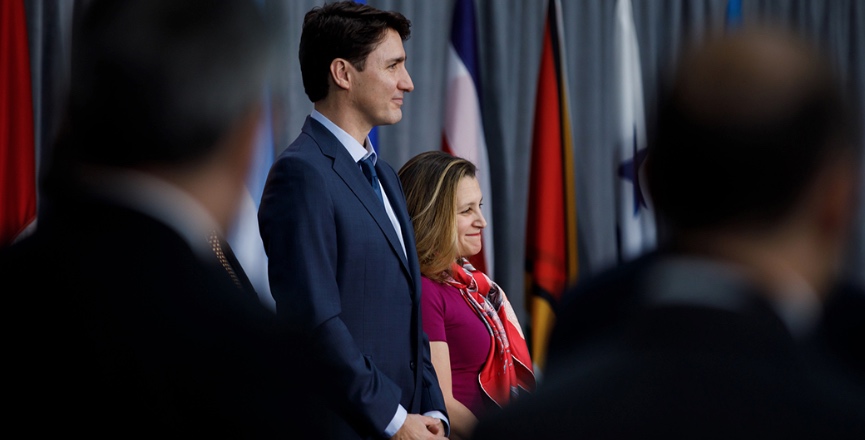Newly elected, Justin Trudeau announced bravely that Canada was “back” on the world stage.
In fact, under the Liberals, Canada’s new foreign policy is the same as the old foreign policy.
To get along with the U.S., Canada goes along with the U.S.
As Marjorie Cohn has pointed out currently — in defiance of Article 2 of the UN Charter that prohibits the threat or use of force, except in self-defence, or as authorized by the Security Council — key officials in the Trump administration, Secretary of State Mike Pompeo and National Security Advisor John Bolton, are threatening to make war on Iran.
Foreign affairs specialist Eric Margolis reported a year ago that the U.S. had drawn up plans for a major bombing attack on Iran.
The New York Times headlined an article John Bolton published before joining Trump in the White House: “To Stop Iran’s Bomb, Bomb Iran.”
Secretary of State Pompeo has announced the willingness of the U.S. to deploy 120,000 troops to combat Iran.
U.S. congressional Democrats are wary of sabre rattling by the Trump administration. In the U.S. National Defence Authorization Act of 2019 Congress was explicit: “Nothing in this Act may be construed to authorize the use of force against Iran or North Korea.”
Senator Bernie Sanders has spoken out in dramatic terms saying war with Iran “would be an absolute disaster.”
The Harper Conservatives broke diplomatic relations with Iran in 2012. The Trudeau government wanted Canada to resume normal diplomatic relations with Iran, and a series of meetings have been held between Iranian and Canadian officials without producing agreement.
Under a 2015 treaty sponsored by then U.S. president Obama, and the other permanent Security Council members France, the U.K., China and Russia, plus Germany, Iran agreed to international inspection of sensitive nuclear activities in return for tough sanctions against its regime being removed.
President Trump has revoked U.S. support for the treaty, and has re-imposed stiff sanctions against Iran.
According to the U.S., any country anywhere that violates the U.S. sanctions against Iran, would itself be subject to U.S. sanctions. The U.S. plans to extend this to any country that buys Iranian oil.
Just as the 2015 treaty helped the Trudeau Liberals move towards normalization of relations with Iran, the Trump sanctions meant talks with Iran are no longer mentioned, and Canada is limited to watching events unfold.
Hosting the U.S. president on an official visit to Japan, Prime Minister Abe indicated publicly a willingness to act as an intermediary between Iran and the U.S.
In response Trump asserted that he was not seeking regime change in Iran though this is the obvious goal being pursued by Bolton and Pompeo.
Canada is unwilling to play any role vis à vis the U.S. on Iran. While it could be encouraging the formation of a diplomatic coalition to push back against U.S. warmongering, Canada remains silent for fear of upsetting the U.S. leader, and derailing the Canadian trade agenda.
Team Trudeau was taken by surprise when Donald Trump defeated Hillary Clinton. Trudeau and his closest advisors decided to “pivot towards Washington,” replacing Stéphane Dion as global affairs minister with Chrystia Freeland, so as to better promote and advance the renegotiation of the new NAFTA.
In effect the Freeland appointment reduced the global affairs ministry, once the respected department of external Affairs, to the North American trade ministry. Giving NAFTA renegotiation priority has guided Liberal policy on world affairs.
Thus, when the U.S. issued a questionable extradition request to Canada for the arrest of the second-in-command at telecommunications giant, and American commercial rival, Huawei, Canada complied, at the cost of imperilling relations with the rising world power.
Canada was also quick to join and play a leading role in the Lima group which acts as a U.S. surrogate in the attempt to unseat the president of Venezuela.
With the world facing a climate emergency, the need for world politics to be rethought as common security, rather than national security, is obvious to thinking people around the world, but not to the U.S. government.
On climate action it is surely time for the Trudeau government to commit Canada to a leadership role. Instead of fearing the ire of Washington, Canada needs to engage with American and world public opinion on the defining issue of our times.
Duncan Cameron is president emeritus of rabble.ca and writes a weekly column on politics and current affairs.
Photo: Adam Scott/PMO
Help make rabble sustainable. Please consider supporting our work with a monthly donation. Support rabble.ca today for as little as $1 per month!




